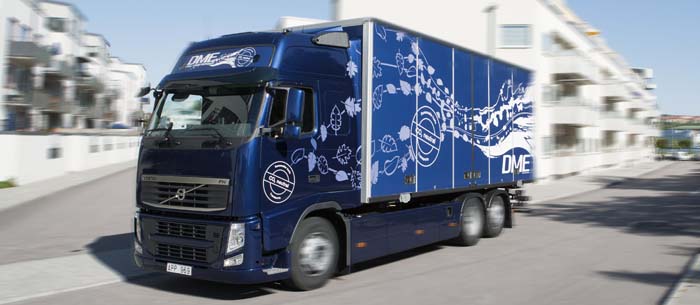A two-year project to show the practicality of Bio-DME as a vehicle fuel has shown that the gas has the potential to reduce CO2 emissions by 95%.
The project is being run by Bio-DME producer Chemrec, fuel distributor Preem and Volvo.

Ten Volvo Bio-DME trucks have now been in regular operation since last autumn and halfway through the project, the results surpass expectations. A short while ago the first of the ten trucks broke through the 100,000 kilometre barrier. All told, the trucks have covered 400,000 kilometres.
"This is the first time Bio-DME is being used as a vehicle fuel on a large scale and following the first evaluation of the field test we can see that the Bio-DME trucks function very well on the road, way exceeding our expectations,” said Per Salomonsson, Project Manager Alternative Fuels at Volvo. “The technology is reliable and the entire process is characterised by energy-efficiency, from production and distribution all the way to the vehicles themselves," PostNord and DHL are two of the haulage firms that are participating in the project. Both aim to drastically cut their CO2 emissions by 2020 and for both these companies participation in the field test was a natural move.
"Our drivers are very pleased. They report that it is at least as easy to run on Bio-DME as it is on conventional diesel fuel. This is an entirely new technology but we have nevertheless experienced very few technical problems and, what is more, the trucks run much more quietly with Bio-DME in the tank," said Henrik Boding, Environmental Affairs Manager for the Logistics business area at PostNord.
"Since 98% of our carbon dioxide emissions come from truck transportation, we see considerable potential in the excellent carbon dioxide efficiency of Bio-DME," said Ulf Hammarberg, Manager Environmental Affairs, DHL.
The biofuel in this project is made from black liquor, a by-product of pulp production, at the Chemrec gasification plant in Piteå. The production system works smoothly and the possibility of delivering the fuel on a large scale depends to a considerable extent on the incentives available for renewable fuels.
"Bio-DME can also be made from other renewable raw materials and we feel this is a vehicle fuel with a great future. We've developed technology that makes it possible to use the fuel in commercial operations. The biggest challenge in the future is to establish a market and an infrastructure for a new vehicle fuel and this requires investment. Here society's decision-makers play an important role in creating the essential preconditions by taking long-term decisions and developing incentives," said Per Salomonsson.
The field test will continue until the end of the year, followed by an evaluation to chart the viability of a future market for Bio-DME. When used as a fuel in a diesel engine, Bio-DME gives an equally high efficiency rating and a lower noise level compared with a conventional engine. Compared with diesel, Bio-DME generates an impressive 95% lower carbon dioxide emission. What is more, its combustion produces very low emissions of particles and nitrogen oxides. All told, this makes Bio-DME an ideal fuel for diesel engines.
What is Bio-DME?
Di methylether (DME) is a non toxic gas that liquefies at about 5 bar. It is simple to handle, similar to handling propane. DME can be produced from natural gas and also from various types of biomass. When it is produced from biomass, it is known as Bio-DME. It has similar properties as LPG. It is an ideal fuel for the highly efficient diesel processes providing ultra-low exhaust emissions and reduced noise levels.